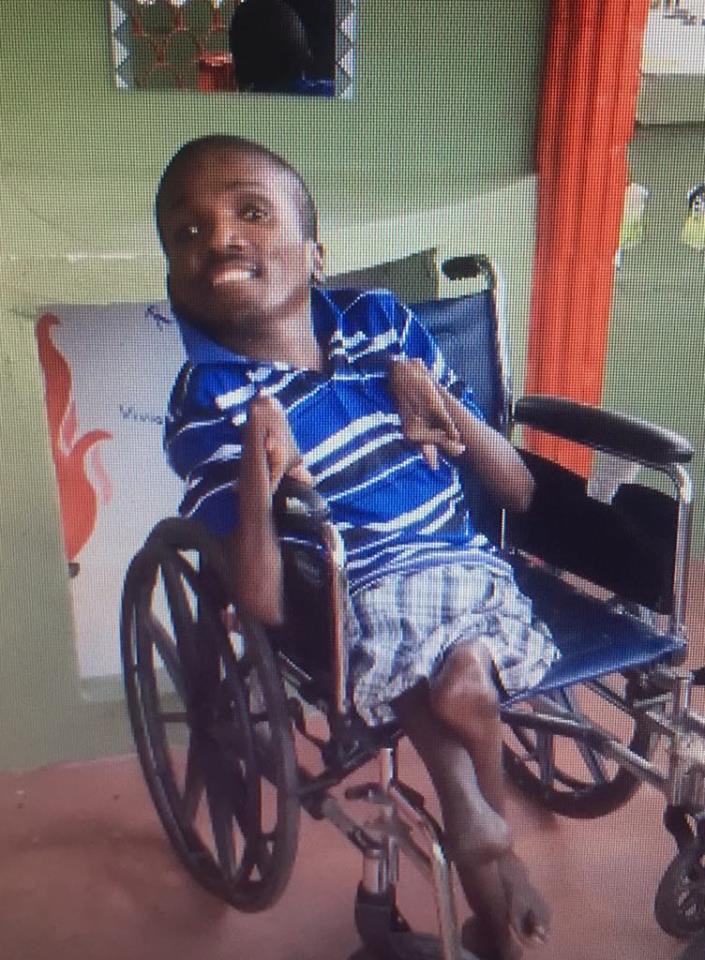At the age of 37, Sipho Vankenic, who was diagnosed with Cerebral Palsy (CP) shortly after birth, cannot walk or move on his own.
Vankenic, who was born and raised in New Amsterdam, Berbice, was taken care of in the early stages of his life by his grandmother. However, after she fell ill about a year ago, he was relocated to Diamond, on the East Bank of Demerara, where he currently resides with his father, Griswald Vankenic, and caretaker, Rita (only name given).
Living quarters situated at the back of the house have been renovated to accommodate Sipho (pronounced sip-hee-oh), increasing accessibility to and from the washroom and making it easier to care for him on a daily basis.
In a recent interview with Sunday Stabroek, the elder Vankenic explained that Sipho has been paralysed from birth.
He was born with hydrocephaly, commonly referred to as “water on the brain.” This involves the buildup of cerebrospinal fluid (CSF) within the skull. Hydrocephalus can arise before birth or any time afterward. It may be due to many causes, including birth defects, haemorrhaging of the brain, infections, meningitis, tumours, or head injuries. Without proper drainage or action, hydrocephaly can lead to a brain injury, resulting in CP.
CP describes a group of neurological disorders that affect movement, muscle tone or posture and is caused by damage that occurs to the immature, developing brain, most often before birth. Of all children with CP, 40% were born prematurely and 60% born at term. Globally, approximately 17 million people have various forms of CP, which vary in severity.
Sipho has quadriplegia, where all four of his limbs and his torso are paralysed.
Griswald explained that after Sipho was born, both he and Sipho’s mother, with whom he was studying with in Russia, were aware that there was a problem.
As a result, he said Sipho spent long periods in the hospital as doctors tried to improve his condition but they eventually announced that there was nothing they could do.
Griswald recalled that during pregnancy, doctors had advised Sipho’s mother that there was a possibility that he could be born with deficiencies but she insisted on proceeding with the birth. However, he said she later abandoned him.
‘Dedication and patience’
While Sipho can speak and is able to communicate his feelings and needs, Griswald and Rita chose to speak on his behalf to Sunday Stabroek. “…His brain is functioning, so he understands, Griswald said. “He understand music and could even sing behind the music. And he knows when certain programme come on. He could say, ‘7 ’O clock news’ and you know if [they] have the introduction before the news come on, he could say all the words,” he added.
Sipho moves around with the use of a wheelchair or is alternatively lifted. He cannot turn without assistance, even if he is lying in bed. Griswald usually lifts Sipho onto his wheelchair and takes him around the house, or out on the verandah for fresh air before he is returned to bed.
If he is not in bed, he is usually listening to the radio or watching television.
Rita said taking care of Sipho requires a lot of dedication and patience. Someone also has to be on the alert to look over him. As a result, on a daily basis, there is one routine that is followed to ensure he is fully taken care of and maintained. This includes cleaning and grooming him and preparing his meals. “Because he is not moving, you can’t give him any and everything. He lay down and he eats or you have to prop him up. But it’s difficult to prop him up because he has weight in his head alone because of the condition,” Rita explained. “…He can’t sit for too long. Probably for like an hour or so he would be up because of the spinal problem,” she added.
Griswald and Rita’s biggest concern is Sipho’s well-being when they grow older. “That’s a big concern, yes. When we won’t be here what is going to happen to him?” Rita questioned.
Griswald said what makes it even more difficult is that there is no institution that he is aware of which would cater for Sipho’s needs.
He noted that such an institution is important, and explained that if given the option, he would place Sipho in a home but not at this present stage. “Because people would not commit their life and this is about committing your whole life,” Griswald said.
They have also been faced with financial constraints in taking care of Sipho. “If you have to take him to the clinic or a doctor, $8,000,” Rita said, while noting that she would usually take Sipho every three months for medical checkups.
Rita is seeking the public’s help to assist in donating a medical bed for Sipho. “At this stage that’s the only thing he need,” she said.
The bed, she noted, will contribute to making him more comfortable.






